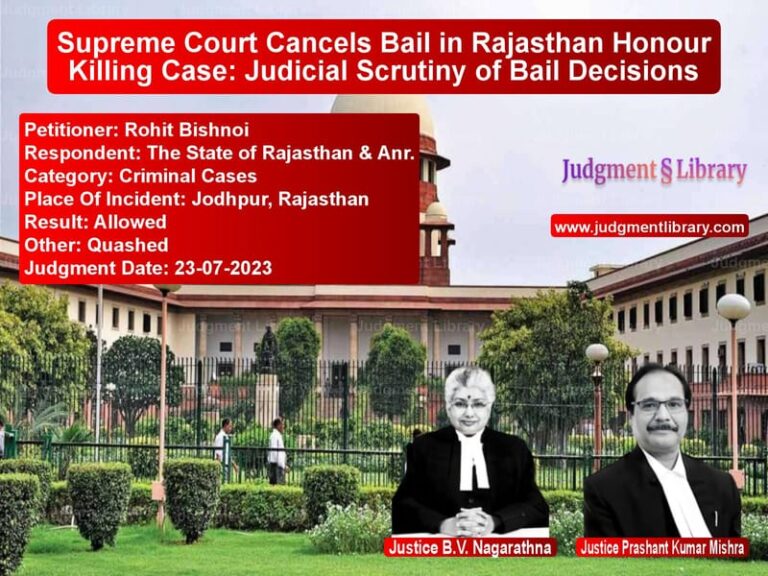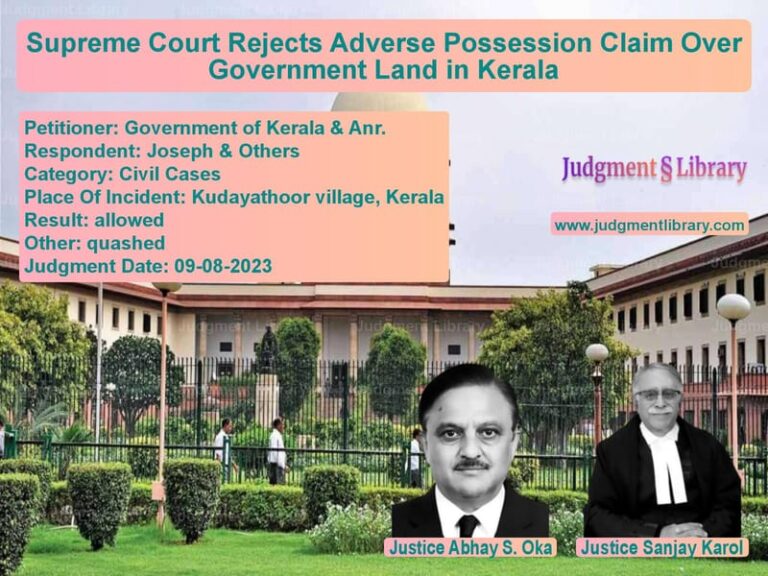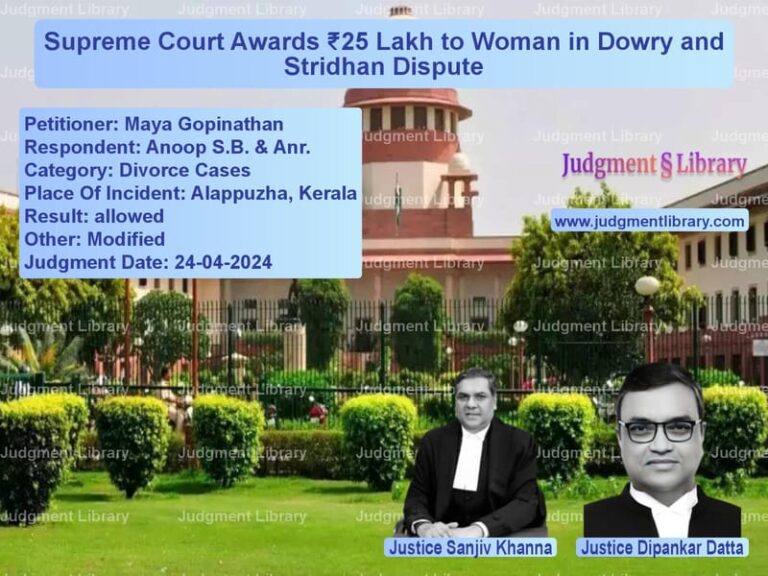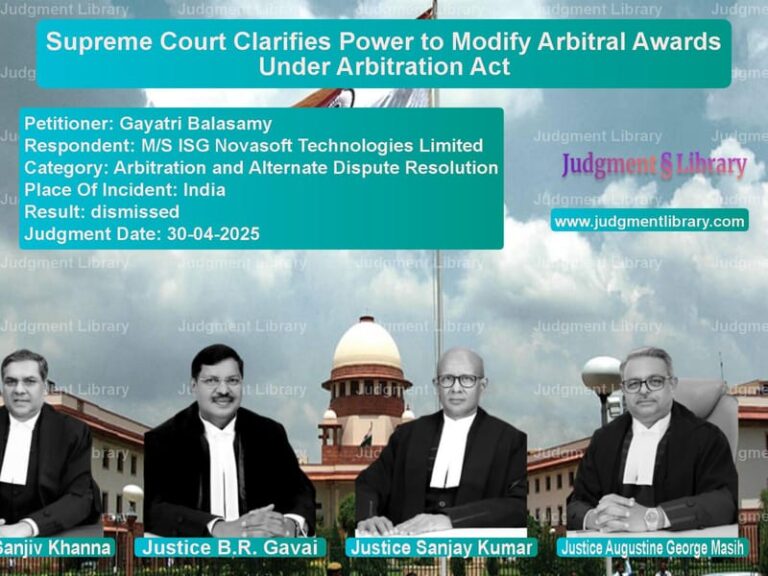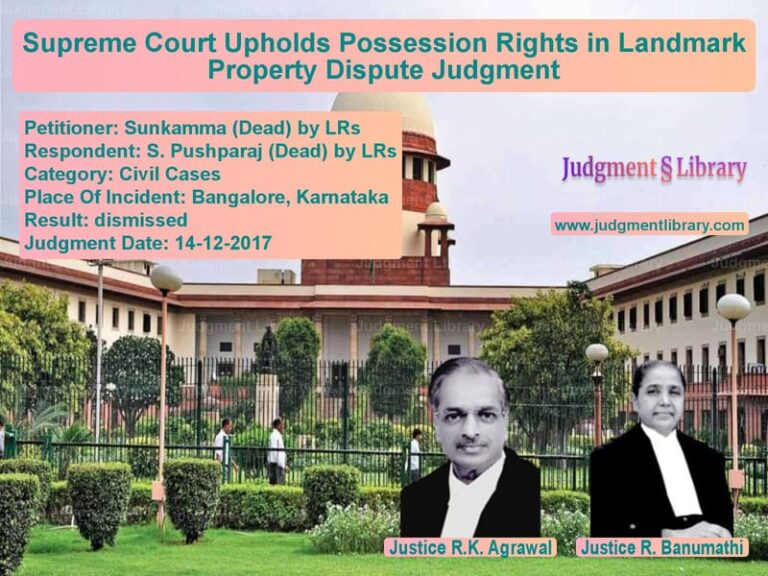Plaint Rejection Under Order 7 Rule 11: Supreme Court Clarifies Procedural Law
The Supreme Court of India’s decision in Sayyed Ayaz Ali vs. Prakash G Goyal & Others clarifies the legal framework surrounding the rejection of a plaint under Order 7 Rule 11 of the Code of Civil Procedure (CPC), 1908. The ruling establishes that a plaintiff cannot be granted time to amend a plaint if it is rejected under Order 7 Rule 11(d), which bars suits based on law.
The judgment highlights the importance of adhering to the procedural safeguards set forth in the CPC and provides clarity on the interpretation of Section 34 of the Specific Relief Act, 1963. The case revolved around a land dispute where the plaintiff alleged that a property sale deed was executed as mere security for a loan. The Supreme Court upheld the rejection of the plaint and ruled that the plaintiff had failed to seek the necessary reliefs.
Background of the Case
The appellant, Sayyed Ayaz Ali, filed a suit in the Senior Division Civil Court, Nagpur, seeking to restrain the defendants from interfering with his possession of certain plots of land. The case involved financial transactions where the plaintiff claimed that the defendants had taken undue advantage of a loan agreement and had fraudulently included their names in sale deeds.
Key details of the case:
- The plaintiff had executed sale deeds in favor of the first and second defendants.
- The plaintiff claimed that these sale deeds were intended as security for loans.
- The plaintiff sought a declaration that the defendants had no real ownership rights over the property.
- The plaintiff, however, did not explicitly seek a declaration that the sale deeds were invalid.
The defendants filed an application under Order 7 Rule 11(b) and (d), arguing that the plaint should be rejected as it failed to include the necessary reliefs required under Section 34 of the Specific Relief Act.
Key Legal Issues
- Whether a plaint can be rejected under Order 7 Rule 11(d) for failure to seek an appropriate declaration.
- Whether the plaintiff should have sought a cancellation of the sale deeds in order to establish his claim.
- Whether a Trial Court can allow a plaintiff to amend a plaint after rejecting it under Order 7 Rule 11.
- Whether the High Court erred in dismissing the writ petition challenging the rejection of the plaint.
Petitioner’s Arguments
The plaintiff, Sayyed Ayaz Ali, contended:
- That he had a legitimate claim over the property and was in possession of the land.
- That the sale deeds executed in favor of the defendants were not actual sales but were meant to serve as security for loans.
- That he did not need to seek a declaration of invalidity of the sale deeds, as his claim was primarily for possession.
- That the Trial Court erred in rejecting the plaint without allowing him to amend it.
Respondents’ Arguments
The defendants argued:
- That the plaintiff had executed registered sale deeds in their favor and could not claim ownership without seeking their cancellation.
- That under Section 34 of the Specific Relief Act, a plaintiff cannot seek declaratory relief without also claiming necessary consequential relief.
- That the plaint was legally barred and rightly rejected under Order 7 Rule 11(d) of the CPC.
- That once a plaint is rejected under Order 7 Rule 11, the plaintiff cannot be granted time to amend it.
Supreme Court’s Observations and Judgment
Rejection Under Order 7 Rule 11(d)
The Supreme Court upheld the rejection of the plaint, stating:
“A plaint must be rejected if the suit appears to be barred by any law. Here, the plaintiff was required to seek cancellation of the sale deeds but failed to do so.”
Mandatory Relief Under Section 34 of the Specific Relief Act
The Court emphasized that the plaintiff could not claim ownership without seeking cancellation of the sale deeds:
“Under Section 34 of the Specific Relief Act, a plaintiff cannot merely seek a declaration that the defendants have no ownership rights without also challenging the sale deeds that legally confer such rights.”
Amendment of Plaint Not Allowed After Rejection
The Supreme Court ruled that a Trial Court cannot permit a plaintiff to amend the plaint once it has been rejected under Order 7 Rule 11:
“Once a plaint is rejected under Order 7 Rule 11(d), there is no scope for amendment. A fresh suit must be filed if necessary.”
High Court’s Dismissal of Writ Petition Upheld
The Court also upheld the Bombay High Court’s decision to dismiss the writ petition, stating:
“The plaintiff’s attempt to challenge the rejection of the plaint was belated and without merit. The High Court rightly refused to interfere.”
Final Ruling
The Supreme Court dismissed the appeal and ruled:
- The plaintiff’s suit was barred by law and the plaint was rightly rejected under Order 7 Rule 11(d).
- The plaintiff was required to seek cancellation of the sale deeds but failed to do so.
- The Trial Court erred in granting time for amendment after rejecting the plaint.
- The High Court was correct in dismissing the writ petition.
Key Takeaways from the Judgment
- Proper reliefs must be sought in property disputes – Plaintiffs cannot avoid seeking necessary declarations under the law.
- Once a plaint is rejected, it cannot be amended – A fresh suit must be filed if required.
- Courts cannot grant relief beyond the pleadings – Judicial intervention must adhere strictly to procedural law.
- Section 34 of the Specific Relief Act must be complied with – Plaintiffs must seek both declaratory and consequential relief.
Conclusion
The Supreme Court’s ruling in Sayyed Ayaz Ali vs. Prakash G Goyal reinforces key procedural principles in civil litigation. It clarifies that when a plaint is rejected under Order 7 Rule 11(d), the plaintiff cannot amend it and must instead file a fresh suit if necessary.
Read also: https://judgmentlibrary.com/ex-parte-decree-and-guardian-appointment-supreme-courts-landmark-ruling/
This judgment serves as a crucial precedent for property disputes, ensuring that claims are filed with complete and appropriate reliefs, preventing unnecessary litigation delays.
Petitioner Name: Sayyed Ayaz Ali.Respondent Name: Prakash G Goyal & Others.Judgment By: Justice D.Y. Chandrachud, Justice M.R. Shah.Place Of Incident: Nagpur, Maharashtra.Judgment Date: 20-07-2021.
Don’t miss out on the full details! Download the complete judgment in PDF format below and gain valuable insights instantly!
Download Judgment: sayyed-ayaz-ali-vs-prakash-g-goyal-&-ot-supreme-court-of-india-judgment-dated-20-07-2021.pdf
Directly Download Judgment: Directly download this Judgment
See all petitions in Property Disputes
See all petitions in Contract Disputes
See all petitions in Specific Performance
See all petitions in Landlord-Tenant Disputes
See all petitions in Legal Malpractice
See all petitions in Judgment by Dhananjaya Y Chandrachud
See all petitions in Judgment by Mukeshkumar Rasikbhai Shah
See all petitions in dismissed
See all petitions in Quashed
See all petitions in supreme court of India judgments July 2021
See all petitions in 2021 judgments
See all posts in Civil Cases Category
See all allowed petitions in Civil Cases Category
See all Dismissed petitions in Civil Cases Category
See all partially allowed petitions in Civil Cases Category


